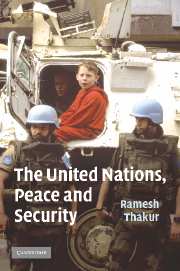Book contents
- Frontmatter
- Contents
- List of figures
- List of tables
- Foreword, Gareth Evans
- Acknowledgements
- Introduction
- PART I An international organisation for keeping the peace
- PART II Soft security perspectives
- 3 Human security
- 4 Human rights: civil society and the United Nations
- 5 International criminal justice
- 6 International sanctions
- PART III Hard security issues
- PART IV Institutional developments
- Conclusion: at the crossroads of ideals and reality
- Index
4 - Human rights: civil society and the United Nations
Published online by Cambridge University Press: 24 May 2010
- Frontmatter
- Contents
- List of figures
- List of tables
- Foreword, Gareth Evans
- Acknowledgements
- Introduction
- PART I An international organisation for keeping the peace
- PART II Soft security perspectives
- 3 Human security
- 4 Human rights: civil society and the United Nations
- 5 International criminal justice
- 6 International sanctions
- PART III Hard security issues
- PART IV Institutional developments
- Conclusion: at the crossroads of ideals and reality
- Index
Summary
The rise and diffusion of human rights norms and conventions and the extension and diffusion of international humanitarian law (IHL) were among the truly great achievements of the last century. The United Nations was at the centre of that effort, led in particular by individuals and non-governmental organisations (NGOs). The ‘first-generation negative rights’ emerged from constitutional traditions that prevented the state from curtailing the civil rights and political liberties of citizens; the ‘second-generation positive rights’ reflected the agenda of many newly independent but poor countries to prescribe an activist agenda of social and economic rights for their citizens; and the ‘third-generation solidarity rights’ pertain to collective entities rather than individuals based on notions of solidarity.
The human rights machinery in the UN system works in three areas: information, analysis and policy development; provision of support to human rights bodies and organs; and promotion and protection of human rights. For all this to be sustainable, robust human rights institutions have to be built at the country level. The Office of the High Commissioner for Human Rights (OHCHR) has developed the practice of assigning human rights advisers to country teams. The challenge is to build on the progress achieved by helping countries to advance the protection of human rights at home through legislative, judicial and other enforcement measures and mechanisms. Improvements to human rights should be related to human rights capacity-building and be attentive to strains on the limited resources of developing countries.
- Type
- Chapter
- Information
- The United Nations, Peace and SecurityFrom Collective Security to the Responsibility to Protect, pp. 93 - 112Publisher: Cambridge University PressPrint publication year: 2006



